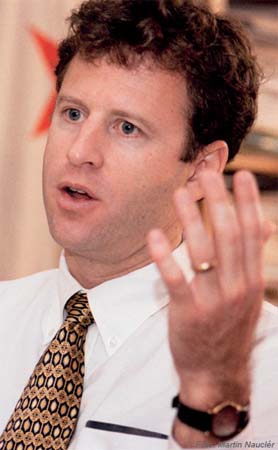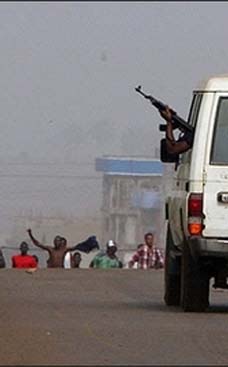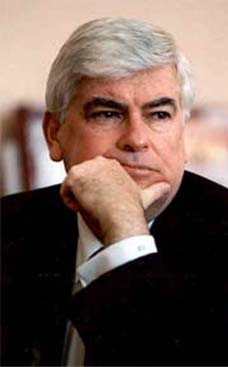
"All that said, a very sober and clear-eyed case remains for regional diplomacy, involving not only Iran, Iraq, Syria and the United States but Turkey, the Gulf states, Egypt, Jordan and the European Union and U.N. This would not be diplomacy in the sense of trading favors with friendly states, all of which basically share common interests. Rather, it would be a savvier, realpolitik type of negotiation designed as much to pressure Iran as to ask for its help, as much to convey our resolve to remain a Persian Gulf power as to plead for assistance in dealing with the mess in Iraq. " Michael O'Hanlon, a Senior Fellow at the Brookings Institute and a Visiting Lecturer at Princeton University, served as a Peace Corps Volunteer in Congo Kinshasa.
Michael O'Hanlon writes: We agree with those who counsel against expecting big help in Iraq from Iran or Syria
Regional diplomacy potential
By Carlos Pascual/ Michael O'Hanlon
January 21, 2007
As perhaps its central proposal, the Baker-Hamilton Iraq Study Group Report recommended a major U.S. effort to enter discussions with the likes of Iran and Syria to discuss the ongoing mission in Iraq. This approach seemed weak or unpromising to many critics, however.
Predictably, the Bush administration rejected it, with the president declaring in his Jan. 10 speech that the United States would step up its military efforts to challenge Iran's meddling inside of Iraq. True to his word, Mr. Bush has since authorized raids against individual Iranians inside Iraq believed to be involved in stoking the conflict through the transfer of money, weapons or intelligence.
We agree with those who counsel against expecting big help from Iran or Syria. Iran in particular, under the leadership of the firebrand President Mahmoud Ahmadinejad, seems unlikely to want to assist the United States in Iraq in any way. There was a time when some hoped we could recreate the spirit of U.S.-Iranian cooperation that prevailed after the overthrow of the Taliban in Afghanistan. Others suggested that by promising Iranian leaders we would not overthrow their regime, we could address Tehran's most pressing security concerns and elicit its cooperation.
Underlying all of this was the assumption Iran would not want major instability on its western border. But it now seems at least as likely that Iran is willing to accept some instability in Iraq as a worthwhile price for a historic defeat of the United States, reducing America's influence not only in Iraq but throughout the region.
All that said, a very sober and clear-eyed case remains for regional diplomacy, involving not only Iran, Iraq, Syria and the United States but Turkey, the Gulf states, Egypt, Jordan and the European Union and U.N.
This would not be diplomacy in the sense of trading favors with friendly states, all of which basically share common interests. Rather, it would be a savvier, realpolitik type of negotiation designed as much to pressure Iran as to ask for its help, as much to convey our resolve to remain a Persian Gulf power as to plead for assistance in dealing with the mess in Iraq.
To be specific, there are three main hard-headed reasons to convene an ongoing regional diplomatic process over Iraq, even if we should not expect breakthroughs as a result. First, such a process will allow the United States and its allies to disabuse Iran of any belief it can drive us out of the region through a defeat in Iraq. Second, it will at least marginally elicit greater help from some countries -- if not in terms of deploying troops to Iraq, then at least in terms of accepting refugees, providing economic aid, and so forth.
Third, and more subtlely, it will create a mechanism that might be useful in the future, when the environment is riper for a peace deal within Iraq -- or, heaven forbid, when the danger of Iraq's civil war mutating into a regional conflagration has grown.
As to conveying resolve, Tehran may believe that with its large population, the recent successes of its partners in places like Lebanon, its burgeoning nuclear capabilities and developments in Iraq, it is positioned to become the region's great power through combined charismatic appeal, economic weight and military might. To some extent it would become the champion of Muslims throughout the broader region; to some extent it would usher in what Vali Nasr calls the Shia Revival, at the expense of other states.
But most other Middle East countries are nervous about Iran. While hardly spoiling for a fight, they want to show resolve in the face of Iran's rise.
Regional diplomacy would allow numerous countries to send Iran the message that, whatever may happen in Iraq, their partnerships with the United States will endure. Secretary of State Condoleezza Rice has just worked with some of America's key regional partners to send such a message. But a one-time effort is not enough, and the message might transmit better with Iran also in the same room. If Iran comes to realize the United States is in the region for the long haul, its thinking about Iraq may shift at least slightly, and its interest in fomenting mayhem there may decline somewhat.
Second, we need help in managing various aspects of the Iraq war -- and regional states as well as the broader international community can help provide it. Civil war in Iraq is displacing 100,000 Iraqis a month right now. A clear plan is needed to handle millions more refugees. Hard questions must be asked about who will host them, whether they can be steered to jobs, whether they will be concentrated in refugee camps that can become their own caldrons for violence -- and how insurgents and terrorists will be separated out from innocent civilians
These are not easy issues and do not get fixed by themselves. U.N. expertise needs to be drawn in. A regional fund will be needed to share the costs. It would also be nice to get more international assistance for new initiatives such as the administration's proposed job creation program; a regional forum may elicit larger pledges than have been made so far.
Third, states in the region and internationally need to create pressure for all parties to stay out of the conflict in Iraq. That will be difficult. Much is made of Iranian and Syrian meddling. In fact, virtually every state in the region is engaged in some way, hedging against further ascendancy of its perceived worst enemy. The worst-case scenario is declaration of a Kurdish state that draws Turkey and Iran directly into the war, with Sunni Arabs reacting to Iran by funding and supplying Sunni extremists. No side can win in such a conflagration. The red lines against it should be drawn now.
Of course, no one should expect a regional negotiation to settle the war in Iraq. For now, the Shi'ites think they can win and probably will try to do so. Iran has little incentive to restrain its Shi'ite brethren. But the United States needs to be smart about the realities of civil war. At some point, there must be a political deal to stop the fighting or insurgents and terrorists will continue to kill, maim and disrupt because they think time is on their side.
That type of accord may not be possible now. But there is still reason to create the foundations for a political process that can be used to press for a settlement as the surrounding states lose patience with the chaos.
Regional dialogue is not an alternative to President Bush's surge concept. It is a necessary complement -- and if the surge goes badly, it will become a critical element of an alternative strategy.
If the surge brings stability, having a regional framework to build on such progress could help. If the surge fails, it will still be important to have a mechanism to restrain the worst.
Eventually parties will get tired of the killing. It is better to create a way for them to come together now, rather than later make the very act of creating a process yet another political concession that delays a rational outcome.
The U.S. talks to Kim Jong-il's regime through a northeast Asian regional process today. There is no reason to avoid doing so with Iran and Syria in the Middle East, as long as we do so with eyes wide open about the purposes of such dialogue and what it can realistically accomplish. .


















